- europages
- >
- COMPANIES - SUPPLIERS - SERVICE PROVIDERS
- >
- sludges
Results for
Sludges - Import export
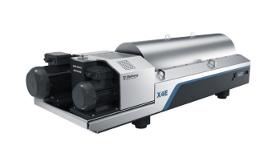
FLOTTWEG SE
Germany
Sewage sludge dewatering offers enormous potential savings for operators of sewage treatment plants. Dewatering sludge means reducing the quantity of sludge for disposal. Depending on system capacity, 1 percent more dry substance can lead to cost savings in the five- to six-digit range. The dewatering performance of the Flottweg Xelletor Series is significantly better than even its predecessors. It sets new benchmarks for throughflow, dry substance, and polymer and energy consumption. The Xtra in performance at low consumption in comparison with our high-performance C Series: ►Xtra dewatering performance: Up to 10 percent less sludge volume due to higher total dry solids in dewatered sludge ►Xtra polymer savings: Up to 20 percent savings on flocculant consumption ►Xtra capacity: Up to 15 percent more throughflow ►Xtra energy savings: Up to an additional 20 percent energy savings
Request for a quote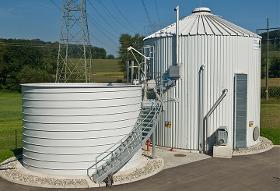
LIPP GMBH BEHÄLTER UND SYSTEMLÖSUNGEN
Germany
SYSTEM SOLUTIONS FOR SEWAGE SLUDGE DIGESTION In the municipal sector, the focus is on the production of biogas from sewage sludge. The aim is to make the energy potential of the primary and secondary sludge from anaerobic sludge digestion usable. On the one hand heat and electrical power is obtained for operation of the sewage plant. On the other hand, the sludge is conditioned so that the other aerobic process stages can run more efficiently and thus more cost effectively. The Lipp KomBio reactor has established itself as an ideal solution in the municipal sector due to its construction and long service life and has been successfully installed in hundreds of plants at home and abroad. Thanks to the application of the SBR process in our digesters, and the tank geometry and construction, it is possible to make optimum use of the low energy potential of the sewage sludge and operate sewage sludge digestion economically.
Request for a quote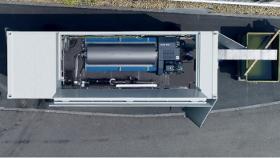
FLOTTWEG SE
Germany
In small sewage treatment plants, investment costs play a decisive role. In stationary dewatering systems, for example, the construction of a new building can be significantly costly. You can avoid those costs with mobile container systems for sludge dewatering. Container-based solutions are a practical alternative to fixed dewatering installations.. A container is a true "plug and play" option – just connect it and start dewatering. ►Sludge dewatering in a one-man operation: comfort and personal safety, with control of the dewatering installation directly on-site. ►Year-round comfort: raised roof; insulated walls and roof, consistent use of stainless steel. ►Minimized maintenance effort: The roof can be opened by a single person using a manual hydraulic lifting system; the decanter can be opened with a crane built into the container. ►Optimized for operation in the smallest of spaces ►Easy transport with all current truck types
Request for a quote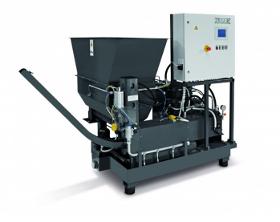
RUF MASCHINENBAU GMBH & CO. KG
Germany
Grinding chips are created by the grinding of metal components. It is a mixture of metal and corundum abrasion in combination with the cutting fl uids being used. By briquetting, the waste is reduced significantly and the briquettes possess a defi ned residual moisture. Thus, the disposal costs are reducedand depending upon the alloy, there is even the opportunity to sell the briquettes with a profit. In most cases, the expensive oil contained in the cutting fl uid can be reused. The briquetting system can already payoff for itself within less than 12 months by processing about 10 to 30 tons of the expensive oil contained in the cutting fl uid per year. Depending on the requirements, our briquetting systems for grinding chips are equipped with hydraulic motors ranging from 4kW to 22kW, and reach a specifi c pressure of up to 3,800 kg/cm². The throughput of the RUF briquetting systems - especially for grinding chips - range from 40 to 350 kg/h.
Request for a quote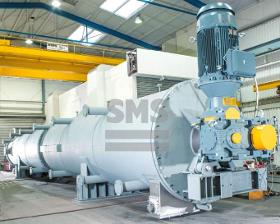
BUSS-SMS-CANZLER GMBH
Germany
SMS offers sludge drying systems with horizontal thin film dryers for treatment of sludge from municipal as well as from industrial waste water treatment plants. Variations of this sludge treatment process are: Pre-drying up to 35 to 50 % dry solid content before incineration in fluidized bed incinerators 65 to 75 % dry solid content before combined incineration with garbage, composting or landfill Full drying up to 85 to 95 % before thermal utilization as bio-fuel for cement kilns, coal fired power stations, pyrolysis, gasification or other conversion processes before composting and agricultural usage as fertilizer and for soil reclamation In all these drying processes the thin film dryer is the first choice.
Request for a quote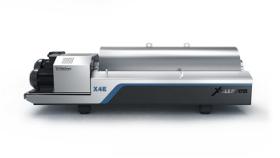
FLOTTWEG SE
Germany
Honored with the German Innovation Award 2019, the Xelletor series is one of the greatest achievements in the field of sewage sludge. Dewatering sewage sludge is standard for wastewater treatment plants and since it usually has to be transported away, operators have an interest in separating as much water as possible from the sludge. This saves weight and thus reduces costs. Savings of up to 10% in sludge volume and 34% in energy consumption are possible. Our Xelletor high-performance centrifuge inspires customers all over the world with the many years of technical know-how and innovative spirit behind it.
Request for a quote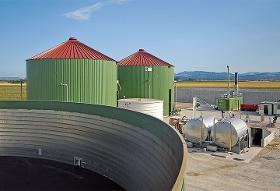
LIPP GMBH BEHÄLTER UND SYSTEMLÖSUNGEN
Germany
As well as the high quality, end customers and engineering offices alike appreciate Lipp’s process expertise and close, professional working methods. In addition to individual planning and timely installation, the service package is also rounded off by extensive tank inspections. Depending on customer requirements, Lipp offers its partners support in the preparation of necessary planning criteria such as design, heat and energy calculations etc. Lipp’s objective is to be the most reliable partner for municipal sewage treatment plants and for engineers for municipal waste water treatment and sludge digestion. To achieve this, in addition to the product quality, the professional, timely and economical completion of projects is constantly being improved. In order to work with end users and engineering offices as effectively as possible, the technical process expertise is also being constantly expanded by the ongoing qualification of employees and high investments in research.
Request for a quote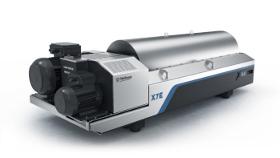
FLOTTWEG SE
Germany
Flottweg has developed a unique centrifuge concept especially for the high-level dewatering of sewage sludge: The Flottweg Xelletor series. For the wastewater treatment plant operator, dewatering offers enormous savings potential. The costs for transport and disposal of dewatered sewage sludge often account for 80% of the operating costs of mechanical dewatering. The dewatering performance of the Xelletor machine is significantly better than that of our predecessor models. And it's setting new standards in terms of throughput, dry substance, and polymer and energy consumption.
Request for a quote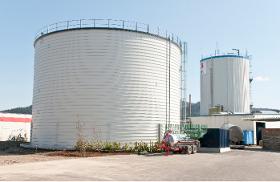
LIPP GMBH BEHÄLTER UND SYSTEMLÖSUNGEN
Germany
LIPP® Liquid Storage Tanks are fabricated with best material, as this is the most important quality factor. Municipal/industrial waste water and sludge or certain processing, intermediate and end products from the chemical, pharmaceutical and food processing industries set high requirements regarding the tank material, for example. LIPP offers a variety of materials, ranging from galvanised steel through the combination material Verinox to highalloy stainless steels. Variants waste water tanks sewage sludge tanks process water tanks storage tanks firefighting water tanks Mixing and compensation tanks buffer tanks stockable sludge tanks rainwater reservoirs Filtrate water tanks activation tanks Percolating filter tanks Landfill leachate tanks & Special tanks on request
Request for a quote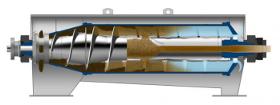
FLOTTWEG SE
Germany
The demands on the quality and efficiency of sewage treatment plants are growing from year to year, not least due to rising energy and disposal costs. As a result, using decanters to dewater sludge means using state-of-the-art technology. The C-series decanters from Flottweg achieve high performance with reduced energy consumption. Flottweg Wastewater Decanters offer advantages over other processes and competitors' machines: ► High dry solids values in the discharged material ► Higher power density within a small footprint ► Powerful Flottweg Simp Drive® drive ► Reduction of operating costs due to reduced need for flocculant ► Additional energy recovery with the Flottweg Recuvane® system ► Economical bowl and scroll drive ► duces the energy consumption of your decanter by 10 to 30 percent
Request for a quote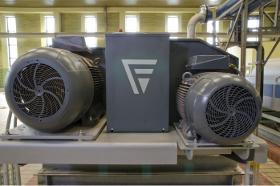
FLOTTWEG SE
Germany
Transport and disposal costs, at over 70 percent, represent by far the largest cost item in sludge dewatering. A powerful dewatering assembly is thus an important criterion. With a Flottweg HTS Decanter in the C series, you can achieve the highest possible total dry solids in the dewatered sludge, thereby continuously saving on transport and disposal. More than 50 years of experience in the dewatering of sewage sludge and continuous further development have gone into the design of the Flottweg HTS Decanter. This experience, combined with references from the entire world, makes Flottweg one of the leading providers of mechanical separation technology. The HTS Decanter is attractive for its performance, its efficiency, and its high cost-effectiveness. The decanters in the Flottweg C series cover a throughput range from about 5 to over 150 cubic meters per hour. We can offer you comprehensive know-how and customized systems.
Request for a quote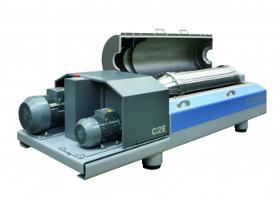
FLOTTWEG SE
Germany
The New C2E Decanter Centrifuges for Small Treatment Plants Flottweg presents a new era of sludge dewatering for small sewage treatment plants. The C2E decanter centrifuge was developed specifically for the dewatering and thickening of smaller sludge loading rates. It features all of Flottweg's know-how in a compact, space-saving design. Over five decades, Flottweg has gathered rich knowledge of the area of sewage sludge thickening and dewatering. That know-how has been transferred into a new generation of environmental centrifuges. Our requirements for the C2E are just as high as for the big Flottweg Decanters. Disposal costs still play a central role, even for small communities. The quality of the machine and its efficiency regarding separation results reduces the overall lifetime costs to a minimum. Want to learn more about our solutions? Then get in touch.
Request for a quote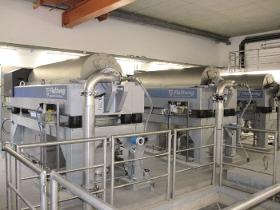
FLOTTWEG SE
Germany
In the process of treating waste water, fine biological sludge is constantly produced during the decomposition process at a sewage treatment plant. For a stable decomposition process in the biological treatment phase, the sludge produced in the secondary sedimentation pond, also known as excess sludge, is removed and fed into the digestion tower. Flottweg's OSE decanters thicken the sludge before it enters the digestion tower. Sewage treatment plants benefit from an even feeding of the digestion tower and can thus optimally use the volume of the digestion tower. The Flottweg OSE decanter is specially designed for sludge thickening. ► Highest gas yield through constant feeding of the digestion tower ► Best possible thickening even with changing feed conditions ► Larger sedimentation volume (due to deep pond and steep cone) enables highest power density (10 - 20 percent) with minimum space requirement
Request for a quote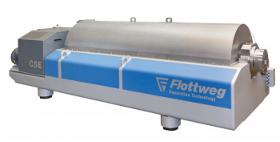
FLOTTWEG SE
Germany
Like all machine sizes in our C series, the C5E is also equipped with optimum wear protection. This reduces maintenance costs, as only wear parts need to be replaced. At the same time, this ensures a longer service life and high machine availability. The Flottweg features Recuvane® and Simp Drive® make the simple, efficient and individual operation of the centrifuge perfect.
Request for a quote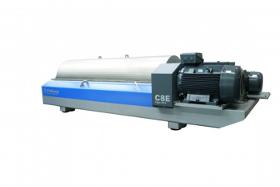
FLOTTWEG SE
Germany
Proven know-how meets state-of-the-art technology. This is the best way to describe the new Flottweg decanter C series. We also have the optimal solution for the very large wastewater treatment plants. The combination of our own Simp Drive® drive system, which has been in use since 1994, and Recuvane®, which allows flexible and simple retrofitting as well as targeted discharge of the centrate water, sets new standards for Flottweg in separation technology.
Request for a quote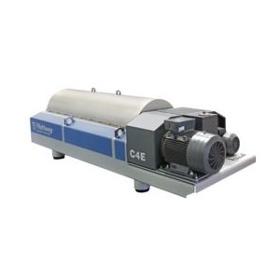
FLOTTWEG SE
Germany
This new decanter series combines the latest know-how in manufacturing, design and engineering with decades of experience. Thus, with the C4E environmental centrifuge, we offer an optimal solution for medium-sized wastewater treatment plants for which quality, reliability and a good price-performance ratio are important.
Request for a quote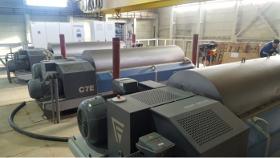
FLOTTWEG SE
Germany
Flottweg C series decanters around the world process 25 million liters of sewage sludge per hour. The dewatering and thickening of sewage sludge plays a decisive role in the wastewater treatment process. Requirements for the quality and efficiency of sewage treatment plants increase year after year, not least driven by the increasing costs of energy and disposal. As a result, the state of the art is now to use decanter centrifuges to dewater and/or thicken the incoming sludge. Flottweg developed the decanters of the C series especially for this purpose. The C7E represents the largest of all the C machines. The C7E increases the proportion of dry substance in the sludge, thereby reducing its volume and weight (due to loss of water). That means that operators need to dispose of, recycle, or burn less sludge. The result: enormous potential savings for the operators of sewage treatment plants.
Request for a quoteDo you sell or make similar products?
Sign up to europages and have your products listed
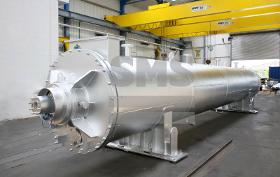
BUSS-SMS-CANZLER GMBH
Germany
The wet product fed through the inlet nozzle is picked up by the rotor blades, applied on the hot wall and simultaneously conveyed towards the outlet nozzle at the opposite end of the body. The generated vapours are streaming counter-currently to the product flow and are leaving the dryer close to the feed nozzle. Evaporating and conveying capacity are adapted by the right rotor blade arrangement. Entrained particles from the dry zone are removed in the wet zone. Moisture levels of less than 1 % can be achieved. The residence time of the product is typically between 5 and 15 minutes. The outstanding heat transfer rate for hot solid products enables cooling of large amounts of solids in a compact machine compared to usually used cooling screws and without cooling air.In product melting like the melting of urea, the particles are heated up and molten inside the dryer. The melt can be mixed with other liquid and solid additives to improve the properties of the final products.
Request for a quote
ERC ADDITIV GMBH
Germany
THE EFFECT The following factors accelerate the formation of sludge deposits (black sludge) in car engines: - Fuel-efficient, „lean-burn“ engine concepts - Inferior-quality petrol and engine oil - Extended driving at excessively low engine speeds THE ADVANTAGES AT A GLANCE: - Removes sludge deposits (black sludge) within the engine - Ensures optimum lubrication - Prevents engine damage caused by blocked oil ducts
Request for a quote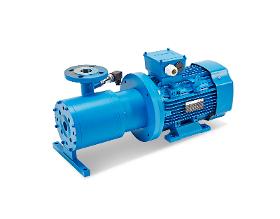
AQUAMETRO OIL & MARINE GMBH
Germany
Your benefits Better fuel quality for combustion Blend fuel improvement Prevent sludge in case of fuel incompatibility Increases amount of burnable fuel Less wear and tear on engine components Optimization of combustion process Fuel treatment / conditioning Less clogged filters Areas of application The Homogenizer is a dynamic milling machine which can be used in the fuel system on board ships. It is designed to improve your fuel quality which will lead to a better combustion and less maintenance. Furthermore it can reduce sludge in case of fuel incompatibility. Increase the amount of burnable fuel in case of bad fuel quality. The Homogenizer has a high saving potential.
Request for a quote
MSE FILTERPRESSEN GMBH
Germany
Especially in rapidly changing markets, it is all the more important to rely on a partner with many years of market and expert knowledge. With semi-mobile container plants – similar to mobile filter presses – we support you in defying the rapid changes on the market in order not to jeopardise your core business. Semi-mobile filter presses can be used flexibly and are also quickly ready for operation. Furthermore, the semi-mobile filter press is fully equipped and immediately ready for operation after connecting to sludge, water and power supply. MSE Filterpressen® engineers and manufactures the plants for individual customer requirements. In this way, the best possible result can be achieved for every task. The semi-mobile filter press from MSE is available in various designs. The sizes of the semi-mobile filter presses are available up to a maximum size of 1500 format. This corresponds to about 100 chambers, i.e. about three cubic meters of chamber volume.
Request for a quote
MSE FILTERPRESSEN GMBH
Germany
MSE Filterpressen® offers a wide range of filter presses with sidebar technology suitable for both standard and medium duty and for heavy-duty performance levels. Maximum flexibility is provided by choosing between simple manual to fully automated MSE filter press designs. MSE chamber filter presses are upgradable in terms of modules and features and can be customized to your specific needs and requirements. HIGH PERFORMANCE AND HIGH DEGREE OF CONFIGURATION FOR YOUR CHAMBER FILTER PRESS The chamber filter press can be configured as required depending on the series. Taking different influencing factors into account, chamber filter presses achieve a solids content in the filter cake from 30 to over 50 percent. The intelligent filtration principle leads to immense cost savings in the waste water sector, for example. The operation of the chamber filter press is designed for a feed pressure of up to 15 bar in order to successfully filter even the finest particles.
Request for a quote
MSE FILTERPRESSEN GMBH
Germany
Fully automatic filter presses are specifically designed for applications in which a continuous operation and fast cycle times are essential and therefore crucial. MSE fully automatic filter presses provide a high degree of automation while providing uninterrupted operation at the same time. FULLY AUTOMATIC FILTER PRESSES FROM MSE INCREASE PRODUCTIVITY AT THE SAME TIME REDUCING PERSONNEL COSTS The operating time of a fully automatic filter press is 24/7. The option of the simultaneous filter plate opening system, for example, helps to realise a particularly fast cake release reducing the cycle time to a minimum. The result is a high-speed filter press that allows increased production per unit area of filter. For this reason, these machines are used in applications with highly filterable products where high filtration speeds are required. These include, e.g. mining concentrates and residues.
Request for a quote
MSE FILTERPRESSEN GMBH
Germany
MSE stainless steel filter presses comply with the high hygiene and purity standards both in design and processing. With the stainless steel filter press, all components in contact with the product are covered with high-quality stainless steel. This also provides optimum protection against corrosion. FDA-COMPLIANT SOLID-LIQUID SEPARATION WITH THE MSE STAINLESS STEEL FILTER PRESS A large number of materials with different properties are used in the food sector in particular. Here, especially care must be taken to ensure that no ingredients are released into the food. The law stipulates a FDA certification for this. Accordingly, all materials used must be FDA-certified. The FDA certification stands for high purity and durability. Each component such as the filter plates, filter cloths and piping systems complies with the FDA guidelines. This contributes to high hygiene and safety requirements.
Request for a quote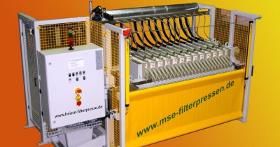
MSE FILTERPRESSEN GMBH
Germany
The hot filter press combines the standard process steps of a membrane filter press, (filtration, filter cake washing and squeezing), with the additional function of a thermal filter cake drying (TCD). As a result, all process steps are carried out in one plant, the hot filter press. Dewatering and drying of the resulting filter cake is thus done without a downstream drying process. Cost-intensive and time-consuming vacuum contact drying is therefore no longer necessary. FUNCTIONAL PRINCIPLE OF THE HOT FILTER PRESS – WITH THERMAL FILTER CAKE DRYING In contrast to the conventional method, the system consists of membrane filter plates and heat exchanger plates, which are installed alternately in a filter press. For thermal drying, hot steam and/or oil is applied to the working space behind the membrane and the filter cake is thermally dried accordingly. The advantage of this process is that a high dry matter content (DM content) of over 90% is achieved.
Request for a quote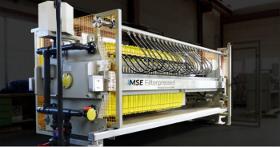
MSE FILTERPRESSEN GMBH
Germany
Membrane filter presses have a great influence on the dryness of the solid by using membrane technology in the filter plates. Compared to conventional filtration processes, it achieves the lowest residual moisture values in the filter cake. This makes the membrane filter press a powerful and the most widely used system. IF TIME AND DEGREE OF DEWATERING ARE CRUCIAL Depending on the degree of dewatering, different dry matter contents ( – percentage by weight of dry material in filter cake) can be achieved in the filter cake by squeezing with membrane plates. The range of achievable dry matter contents extends from 30 to over 80 percent. Membrane filter presses not only offer the advantage of an extremely high degree of dewatering; they also reduce the filtration cycle time by more than 50 percent on average, depending on the suspension. This results in faster cycle and turnaround times, which lead to an increase in productivity.
Request for a quote
MSE FILTERPRESSEN GMBH
Germany
Based on the decisive properties of the flexible material, the rubberised filter press is mainly used for the filtration of particularly aggressive suspensions and environments. The aggressive suspensions include, for example, solvents or acids. In this context, the conventional painting of the steel parts is no longer sufficient. THE RUBBERIZED FILTER PRESS OF MSE AS PROTECTIVE MEASURES AGAINST AGGRESSIVE SUSPENSIONS In a complex process, the load-bearing filter press components are coated with a layer of 3mm thick plastic. In the case of the rubberised filter press, the hydraulic stands, feed stand, pressure plate and supporting beams are hard rubberised and the smaller components are made of polypropylene. It is also possible to rubberise only the components in contact with the product, such as the feed stand and the pressure plate. The composition of the rubber coating depends on the special surface requirements of our customers.
Request for a quote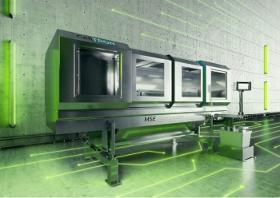
MSE FILTERPRESSEN GMBH
Germany
CellTRON® FOR MAXIMUM FILTRATION REQUIREMENTS The basis of this plant is a membrane filter press. The new product series is equipped with an innovative filter press emptying system with lifetime error message, an automated filter cloth washing system with implemented CIP cleaning function as well as an automatically opening and vacuum-proof housing. In contrast to conventional filter presses, this new development guarantees an almost gastight encapsulation of the filter press. The filter press thus meets the specific requirements for dewatering special (metal) sludges. In addition to standard configurations for battery cell production, this technology series is also suitable for demanding applications that require the highest safety and efficiency standards. These include volatile, dust explosive products as well as substances with toxic and radioactive properties but also pharma food products and hot suspensions (≥130°C).
Request for a quote
MSE FILTERPRESSEN GMBH
Germany
Mobile filter presses are particularly suitable for dewatering sludge from several plants at regular intervals or for compensating capacity peaks and bottlenecks. The fact that mobile filter presses are not subject to approval obligation and are therefore quickly and unbureaucratically available is particularly interesting. MSE mobile filter presses are fully equipped and immediately ready for operation after connection of the sludge, water and power supply. In this way, the best possible result can be achieved for every task. Mobile filter press plants can be implemented in many different designs. The sizes of the mobile filter presses are available up to a maximum size of 1200. This corresponds to about 100 chambers and about three cubic meters of chamber volume. The plants are equipped with suction and pressure-side inline mixers. The PLC plant controls the conditioning parameters in proportion to pressure and/or volume.
Request for a quoteResults for
Sludges - Import exportNumber of results
33 ProductsCountries
Company type